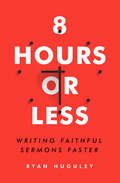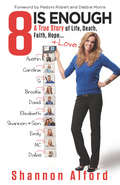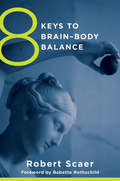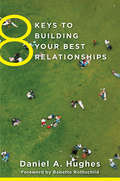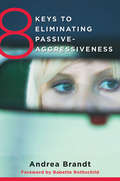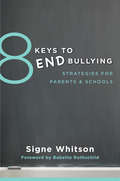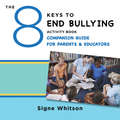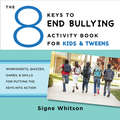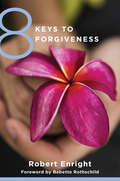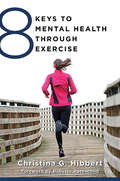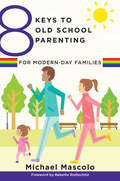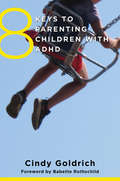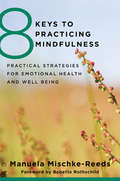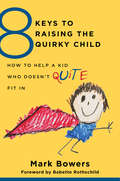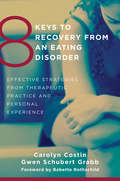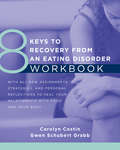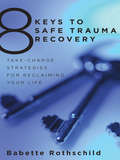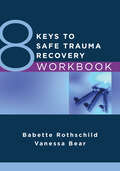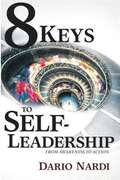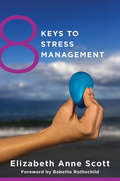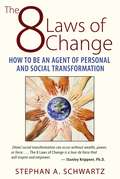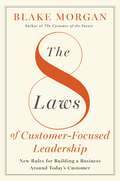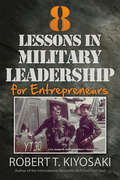- Table View
- List View
8 Hours or Less: Writing faithful sermons faster
by Ryan HuguleyWhat every pastor wants: more time. The clock is every pastor&’s nemesis. Between meetings, administration, counseling, and other duties, it&’s hard to find enough time for sermon prep. Unless you change the process.8 Hours Or Less will show preachers how to write the same sermons they&’ve been writing, but in half the time. Author Ryan Huguley reveals:The biggest time-wasters in sermon prepThe five marks of a faithful sermonA day-by-day plan for writing sermonsTips for preparing your mind, heart, and notes for preaching Common pitfalls in ending a sermonAnd moreHuguley is a pastor and the host of a podcast featuring leaders like Matt Chandler, Doug Wilson, and Nancy Ortberg. What he shares in 8 Hours or Less is a process he&’s been refining for six years, and it has radically improved both his preaching and experience in ministry. Why work harder when you can work smarter? 8 Hours or Less brings relief to the time crunch and helps pastors be healthier, more balanced, and more effective—all without making their sermons suffer for it.
8 Hours or Less: Writing faithful sermons faster
by Ryan HuguleyWhat every pastor wants: more time. The clock is every pastor&’s nemesis. Between meetings, administration, counseling, and other duties, it&’s hard to find enough time for sermon prep. Unless you change the process.8 Hours Or Less will show preachers how to write the same sermons they&’ve been writing, but in half the time. Author Ryan Huguley reveals:The biggest time-wasters in sermon prepThe five marks of a faithful sermonA day-by-day plan for writing sermonsTips for preparing your mind, heart, and notes for preaching Common pitfalls in ending a sermonAnd moreHuguley is a pastor and the host of a podcast featuring leaders like Matt Chandler, Doug Wilson, and Nancy Ortberg. What he shares in 8 Hours or Less is a process he&’s been refining for six years, and it has radically improved both his preaching and experience in ministry. Why work harder when you can work smarter? 8 Hours or Less brings relief to the time crunch and helps pastors be healthier, more balanced, and more effective—all without making their sermons suffer for it.
8 Is Enough: A True Story of Life, Death, Faith, Hope
by Shannon AlfordWhen the five Schwartz children tragically lost both parents in three years, their aunt Shannon Alford learned the true meaning of living worship. With three kids of their own, Shannon and her husband, Sion, became the guardians of all five grieving children, leaving their home bursting at the seams with eight kids between the ages of five and fifteen.Join the Alford-Schwartz family as they relive their journey of healing and divine provision. Complete with inspirational words from each precious child, 8 Is Enough will touch your heart and remind you that no matter what you are facing, God will make all things work together for your good.
8 Keys to Brain-Body Balance
by Babette Rothschild Robert ScaerTake-charge strategies to heal your body and brain from stress and trauma. Understanding how our brains and bodies actually work is a powerful tool in mitigating the anxiety generated by unpleasant physical and emotional symptoms that we all may experience from time to time. Here, Robert Scaer unravels the complexities of the brain-body connection, equipping all those who are in distress with a plausible explanation for how they feel. Making the science accessible, he outlines the core neurobiological concepts underlying the brain-body interface and explains why physical and emotional symptoms of stress and trauma occur. He explains why "feelings" represent physical sensations that inform us about the nature of our brain-body conflicts. He also offers practical, easy-to-implement strategies for strengthening motor skills, learning to listen to our gut to gauge our feelings, attuning to the present, and restoring personal boundaries to relieve symptoms and navigate a path to recovery.
8 Keys to Building Your Best Relationships (8 Keys to Mental Health)
by Daniel A. Hughes Babette RothschildBringing attachment theory essentials to everyday life. A revolution is under way in how we understand the nature of relationships, how we develop in those relationships, and how our brains function synergistically in connection with others. This field is known as attachment theory, and until now most of the cutting-edge insights have been written in "researcher-speak" and reserved for neurologists, psychologists, and others in the healing professions. Here veteran therapist and specialist in attachment disorders Daniel A. Hughes demystifies the research for lay people. By summarizing in short, easy-to-read "keys" the theory and brain science that underpin our ability to form relationships, he skillfully reveals how we can become better friends, spouses, siblings, and children. For anyone interested in how to develop meaningful new relationships or how to deepen and enrich their current ones, this book makes sense of it all.
8 Keys to Eliminating Passive-Aggressiveness (8 Keys to Mental Health)
by Andrea Brandt Babette RothschildGuidance for dealing with this common and frustrating form of behavior. Many people often say "yes" to something when they'd rather say "no." They offer cooperation through words but follow up with how they really feel--in actions that contradict their words. That's passive-aggression. At its heart, passive-aggression is about being untrue to oneself, which makes it impossible to have a clean relationship with others. Passive-aggression as a communication method doesn't make someone "bad." It is simply a strategy learned in childhood as a coping mechanism, a hard-to-break habit. Changing passive-aggressive behavior requires knowledge, tools, and practice, as outlined here. The book offers effective methods for transforming passive-aggression into healthy assertiveness to communicate in constructive ways through eight keys: Recognize Your Hidden Anger; Reconnect Your Emotions to Your Thoughts; Listen to Your Body; Set Healthy Boundaries; Communicate Assertively; Interact Using Mindfulness; Disable the Enabler; and Problem-Solve for Better Outcomes. Hands-on exercises are featured, enabling readers to better understand themselves.
8 Keys to End Bullying: Strategies for Parents & Schools (8 Keys to Mental Health)
by Babette Rothschild Signe WhitsonTackling an all-too-prevalent problem among kids with 8 smart, practical strategies. Groundbreaking books have peered into the psychology of bullying and the cultural climate that--seemingly now more than ever--gives rise to such cruelty and aggression. But few have been able to synthesize what we know into 8 simple, targeted "keys" that equip educators, professionals, and parents with practical strategies to tackle the issue head-on. This book answers that call. Social media bullying--and the recent tragedies stemming from it--has given the widespread problem a new dimension. While no magic cure-all exists, adults can learn and implement all sorts of quick and easy techniques that can make a huge difference in the lives of kids. In 8 core strategies, this book lays them out, from establishing meaningful connections with kids to creating a positive school climate, addressing cyberbullying, building social emotional competence, reaching out to bullies, empowering bystanders, and much more.
The 8 Keys to End Bullying Activity Book Companion Guide for Parents & Educators (8 Keys to Mental Health)
by Signe WhitsonA leader’s manual, with helpful tools, tips, and background information, for adults guiding kids and students through the anti-bullying lessons of The 8 Keys to End Bullying Activity Book for Kids & Tweens The 8-12 age range marks a critical window of time in the social and emotional development of kids, one in which adults are still highly influential. The 8 Keys to End Bullying Activity Book Companion Guide for Parents & Educators, enhances the role of parents and educators in helping young people navigate challenging social dynamics and overcome bullying. As a “leader’s manual” for The 8 Keys to End Bullying Activity Book for Kids & Tweens, it provides helpful guidelines and vital background information for leading kids and students through each of the activities and lessons. Organized around the groundbreaking principles of 8 Keys to End Bullying, the two-book 8 Keys to End Bullying Activity Program for Kids & Tweens builds key social-emotional skills in readers ages 8-12, empowering them to cope with conflict and end bullying in their communities and schools. Younger kids can complete the activities with a parent or teacher's guidance, while older kids can complete the activities independently.These simple activities cultivate (1) assertiveness, emotion management, and friendship skills in kids vulnerable to bullying, (2) problem-solving skills for kids who witness bullying, and (3) empathy and kindness skills in kids who are likely to bully their peers. Books are available individually or as a set.
The 8 Keys to End Bullying Activity Book for Kids & Tweens: Worksheets, Quizzes, Games, & Skills for Putting the Keys Into Action (8 Keys to Mental Health)
by Signe WhitsonA comprehensive, skill-building bullying prevention activity book for school-aged readers The 8 Keys to End Bullying Activity Book for Kids & Tweens is designed to be both useful and fun. There are quizzes, experiments, questions, and answers mixed in with games, puzzles, journaling challenges, and real-life stories that teach kids how to: Tell the difference between rudeness, mean behavior, and bullying Respond well when someone is bullying them Stand up for someone else before, during, and after bullying Have fun online and while texting without hurting others or putting themselves at risk Keep a cool head and make good choices, even when they are upset Pick fun, kind, trustworthy friends Connect with helpful adults when necessary Reach out to kids who bully, knowing that everyone has a story Create awareness about the problem of bullying Every part of this book is designed to teach kids what to do to bring an end to bullying, and to choose kindness whenever possible. Organized around the groundbreaking principles of 8 Keys to End Bullying, the two-book 8 Keys to End Bullying Activity Program for Kids & Tweens builds key social-emotional skills in readers ages 8-12, empowering them to cope with conflict and end bullying in their communities and schools. Younger kids can complete the activities with a parent or teacher's guidance, while older kids can complete the activities independently. These simple activities cultivate (1) assertiveness, emotion management, and friendship skills in kids vulnerable to bullying, (2) problem-solving skills for kids who witness bullying, and (3) empathy and kindness skills in kids who are likely to bully their peers. Books are available individually or as a set.
8 Keys to End Emotional Eating (8 Keys to Mental Health #0)
by Howard FarkasBring an end to emotional eating by getting to the root of the problem. Most books about emotional eating tend to focus on how to strengthen self-restraint or how to identify what triggers it. The former can make the problem worse, while the latter may be different each time it occurs. Both approaches fail to help emotional eaters understand why they feel compelled to do something that they don’t want to do in the first place. This understanding is the key to changing this behavior. Howard Farkas, who has more than two decades of professional and teaching experience as a clinical psychologist specializing in emotional eating, explains the underlying motive that drives the behavior: emotional eating is not a passive failure of self-control, but an active impulse to reject the control of dieting. This defiant need “to be bad” usually leaves the person feeling guilty and anxious about their eating, and recommitting to their diet until the cycle repeats, and the compulsive eating recurs. 8 Keys to End Emotional Eating provides a detailed plan for breaking this pattern. By explaining the root cause that drives the desire to binge, Farkas offers practical skills to help you learn to change your mindset about dieting and end the impulse to binge. His road map for the future will help readers maintain healthy eating habits for years to come.
8 Keys to Forgiveness (8 Keys to Mental Health)
by Robert Enright Babette RothschildA practical guide by the man Time magazine has called “the forgiveness trailblazer.” While it may seem like a simple enough act, forgiveness is a difficult, delicate process which, if executed correctly, can be profoundly moving and a deep learning experience. Whatever the scenario may be—whether you need to make peace with a certain situation, with a loved one or friend, or with a total stranger—the process of forgiveness is an art and a science, and this hands-on guide walks readers through it in 8 key steps. How can we become forgivingly “fit”? How can we identify the source of our pain and inner turmoil? How can we find meaning in what we have suffered, or learn to forgive ourselves? What should we do when forgiveness feels like a particularly tall order? All these questions and more are answered in this practical book, leading us to become more tolerant, compassionate, and hopeful human beings.
8 Keys to Mental Health Through Exercise (8 Keys to Mental Health)
by Babette Rothschild Christina HibbertInspiring strategies from a wellness expert for keeping fit, relieving stress, and strengthening emotional well-being. We all know that exercise is good for physical health, but recently, a wealth of data has proven that exercise also contributes to overall mental well-being. Routine exercise alleviates stress and anxiety, moderates depression, relieves chronic pain, and improves self-esteem. In this inspiring book, Christina Hibbert, a clinical psychologist and expert on women's mental health, grief, and self-esteem, explains the connections between exercise and mental well-being and offers readers step-by-step strategies for sticking to fitness goals, overcoming motivation challenges and roadblocks to working out, and maintaining a physically and emotionally healthy exercise regimen. This book will help readers to get moving, stay moving, and maintain the inspiration they need to reap the mental health benefits of regular exercise. The 8 keys include improving self-esteem with exercise, exercising as a family, getting motivated, changing how you think about exercise, and the FITT principle for establishing an effective exercise routine.
8 Keys to Old School Parenting for Modern-Day Families (8 Keys to Mental Health)
by Babette Rothschild Michael MascoloRaising secure and confident kids using best parenting practices from the past. Does it ever seem to you like kids these days are in control of their parents? Having a strong sense of yourself as a parent is key to raising a resilient, independent, thoughtful, and solution-focused child. But over the last several generations, parents have been immersed in the well-intentioned idea that parenting should be child-centered rather than adult-centered. Many parents have begun to follow their children's lead rather than insist that children adapt to parental prerogatives. Parental authority has come to be seen as a bad thing. The 8 keys presented in this book focus on valuing your own authority as a parent; cultivating your child's character; applying discipline instead of punishment; strategies to motivate compliance; fostering emotional development; problem-solving; conflict management; and effective communication. They will help parents raise self-directed children who are active learners, feel good about themselves, take initiative, and have a strong moral compass.
8 Keys to Parenting Children with ADHD (8 Keys to Mental Health)
by Cindy Goldrich Babette RothschildCompassionate and effective strategies for raising a child with ADHD. Parenting children with ADHD, whether diagnosed or undiagnosed, can be challenging and complex. But just as a child who struggles with reading can learn to decode words, children with ADHD can learn patience, communication, and solution-seeking skills to become more confident, independent, and capable. This book, rich with optimism, tips, tools, and action plans, offers science-based insights and systems for parents to help cultivate these skills. Combining expert information with practical, sensitive advice, the eight "key" concepts here will help parents reduce chaos, improve cooperation, and nurture the advantages--like creativity and drive--that often accompany all of that energy. Based on author Cindy Goldrich's seven-session workshop entitled Calm and Connected: Parenting Kids with ADHD©, this book focuses on developing and strengthening effective interpersonal skills in both parents and children as a way to improve conflict resolution. Following the parenting principle to "Parent the child you have," Goldrich offers advice to help readers tailor their parenting to meet the needs of their unique child. The book also leads parents to recognize the value of being a leader and a guide to children, building parents' confidence in their decision-making, and giving children a sense of safety, security, and confidence. The principles outlined in 8 Keys to Parenting Children with ADHD are appropriate for parenting kids of all ages--until they have "launched" and are on their own.
8 Keys to Practicing Mindfulness: Practical Strategies for Emotional Health and Well-being (8 Keys to Mental Health)
by Manuela Mischke Reeds Babette RothschildLearning how to pay attention to the present moment. Becoming mindful is about the small, everyday things such as pausing to take a breath before you drive off in a hurry or considering the food that will nourish your body before a meal. Or it can mean checking in with yourself before responding to a challenging email or text. Every moment of our lives can become an opportunity to practice mindfulness. This book will invite you to sharpen your awareness and ask yourself with more frequency, "What do I notice right now?" or "How do I need to respond or be with this situation?" These seemingly tiny moments of noticing yourself can have a major impact on your life as you learn to track habitual patterns and awaken to change. Practicing mindfulness is not about being better by figuring it all out. It is about tolerating the moments when you don't know or learning to be more curious about the struggle. Here you will learn how to establish a basic practice with guidelines for posture and breathing as well as various options for meditations that involve sitting, walking, gently moving or lying down. You can try these exercises at your lunch break, before you rise or fall asleep. But best of all is for you to sprinkle mindfulness throughout your day. Whether you are new to mindfulness or a seasoned practitioner, you can make the conscious decision to change your approach to life. Moment by moment you have the opportunity to cultivate awareness that will make a difference in how you engage with the world on a daily basis.
8 Keys to Raising the Quirky Child: How to Help a Kid Who Doesn't (Quite) Fit In (8 Keys to Mental Health)
by Mark BowersTips and strategies for parents of kids who are "different" than all the rest. A quirky child experiences difficulty fitting in and connecting with others usually due to an interpersonal style or behavior that stands out from the other kids. Maybe they are obsessed with a topic of interest or spend excessive hours a day reading, playing video games, or playing with just one toy. These kids are not so far afield as to fall on the autism spectrum, but they are unique, and their behaviors are not addressed in typical parenting books. This book defines quirky markers and offers strategies for parents to understand their children's brains and behaviors; to know what is developmentally appropriate, and what isn't; to understand how to reach their kids; and to help facilitate their social functioning in the world. It will calm the hearts and minds of parents who worry that their child doesn't fit in and offer hope to parents who need strategies to support their quirky child's overall development.
8 Keys to Recovery from an Eating Disorder: Effective Strategies from Therapeutic Practice and Personal Experience (8 Keys to Mental Health) (8 Keys to Mental Health #0)
by Carolyn Costin Babette Rothschild Gwen Schubert GrabbA unique and personal look into treatment of eating disorders, written by a therapist and her former patient, now a therapist herself. This is no ordinary book on how to overcome an eating disorder. The authors bravely share their unique stories of suffering from and eventually overcoming their own severe eating disorders. Interweaving personal narrative with the perspective of their own therapist-client relationship, their insights bring an unparalleled depth of awareness into just what it takes to successfully beat this challenging and seemingly intractable clinical issue. For anyone who has suffered, their family and friends, and other helping professionals, this book should be by your side. With great compassion and clinical expertise, Costin and Grabb walk readers through the ins and outs of the recovery process, describing what therapy entails, clarifying the common associated emotions such as fear, guilt, and shame, and, most of all, providing motivation to seek help if you have been discouraged, resistant, or afraid. The authors bring self-disclosure to a level not yet seen in an eating disorder book and offer hope to readers that full recovery is possible.
8 Keys to Recovery from an Eating Disorder Workbook (8 Keys to Mental Health)
by Carolyn Costin Gwen Schubert GrabbReaders are walked through strategies by a therapist and her former patient. 8 Keys to Recovery from an Eating Disorder was lauded as a "brave and hopeful book" as well as "remarkably readable." Now, the authors have returned with a companion workbook—offering all new assignments, strategies, and personal reflections to help those who suffer from an eating disorder heal their relationship to food and their bodies. Clients of Costin and Grabb consistently tell them that knowing they are both recovered is one of the most helpful aspects of their treatment. With this experience as a foundation, the authors bring together years of clinical expertise and invaluable personal testimony, from themselves and others, to the strategies in this book. Readers will get a glimpse of what it's like to be in therapy with either Carolyn or Gwen. Filled with tried and true practical exercises, goal sheets, food journal forms, clinical anecdotes and stories, readers are guided in exploring their thoughts, feelings, and coping strategies while being encouraged to choose how they want to approach the material. This book is an important resource to anyone living with destructive or self-defeating eating behaviors.
8 Keys to Safe Trauma Recovery: Take-Charge Strategies to Empower Your Healing (8 Keys to Mental Health)
by Babette RothschildSafe and effective principles and strategies for recovery from trauma.<P><P> Trauma recovery is tricky; however, there are several key principles that can help make the process safe and effective. This book gives self help readers, therapy clients, and therapists alike the skills to understand and implement eight keys to successful trauma healing: mindful identification of what is helpful, recognizing survival, having the option to not remember, creating a supportive inner dialogue, forgiving not being able to stop the trauma, understanding and sharing shame, finding your own recovery pace; mobilizing your body, and helping others.<P> This is not another book promoting a new method or type of treatment; rather, it is a necessary adjunct to self-help and professional recovery programs. After reading this book, readers will be able to recognize their own individual needs and evaluate whether those needs are being met. They will have the tools necessary to put themselves in the drivers seat, navigating their own safe road to recovery.
8 Keys to Safe Trauma Recovery Workbook (8 Keys to Mental Health #0)
by Babette Rothschild Vanessa BearExercises of healing and transformation for trauma survivors. Drawing from neuroscience and psychotherapy with empowering strategies to take charge of healing from trauma, this workbook follows the theme of each of the 8 keys in 8 Keys to Safe Trauma Recovery. The two books complement each other; but it is not necessary to have read the original to benefit from this workbook, which presents practical exercises and activities integral to safe trauma recovery and designed to support readers’ control of their mind, body, and life in the aftermath of trauma. One thing is for sure: there is no one-size-fits-all method for healing trauma. This workbook will help readers identify, assess, and celebrate the resources they already have, and add more resources to their toolbox. Most importantly, the authors do not subscribe to the old motto “no pain, no gain,” fostering instead the concept that healing from trauma should not be traumatic.
8 Keys To Self-Leadership: From Awareness To Action
by Dario Nardi8 Keys to Self-Leadership shows you how to honor your natural talents and to stretch yourself into new areas while keeping that sense of learning and wonder you had as a child. In this book, you will be guided through the doors of self-awareness and shown how to unlock the eight ways to find greater satisfaction in all that you do. If you are familiar with Dr. Carl Jung's framework of 8 psychological functions or the 16 Myers-Briggs types, you will find familiar material, though this book takes a developmental approach. Each chapter takes you through one of eight ways we metabolize experiences, including a quiz, in-depth explanation, and two-dozen exercises to explore and develop the benefits of that psychological function in yourself. Everything is based upon extensive research, discussions with multiple experts, and practical experience with clients. This book is a great tool to use on your own or with clients for coaching and skills and leadership development.
8 Keys to Stress Management (8 Keys to Mental Health)
by Elizabeth Anne Scott Babette RothschildEasy strategies for dealing with the near-universal experience of stress. Stress has become a near-universal experience as well as a rising public health concern. According to many measures, people today are dealing with stressors that are greater in number and severity than in the past several decades, and this stress is taking a toll on our collective wellness. Bringing considerable content from her popular stress management Web site on About.com, Elizabeth Scott distills information about stress management into central ideas and strategies for consumers. These include learning to reduce the stress response and stressors, practicing long-term resilience habits, and putting positive psychology research into action. These various perspectives provide a multilayered framework for understanding stress and approaching stress management that is inspirational, action-oriented, and backed by foundational and recent knowledge in the field. The quick-to-read "8 keys" format of the book can be utilized on many levels so that busy readers can quickly find relief from stress.
The 8 Laws of Change: How to Be an Agent of Personal and Social Transformation
by Stephan A. SchwartzScientifically based strategies for enacting successful and enduring change on personal, societal, and global levels, no matter what your background • 2016 Nautilus Silver Award • Shares the stories of people who have changed history, such as Martin Luther King Jr., Ben Franklin, and Gandhi, detailing how they used the 8 laws of change • Based on more than 16 years of scientific and historical research as well as the author’s own experiences during the Civil Rights movement • Explores research in the fields of medicine, neuroscience, biology, and quantum physics to reveal the science of how the 8 laws of change work Inspired by his own powerful experiences during the Civil Rights movement in the 1960s and other social movements in the ’70s, ’80s, and ’90s, Stephan Schwartz spent 16 years researching successful social transformations, uncovering the science and the patterns behind them all. He found that there are three ways to create social change. The first is the advancement of technology and science. The second--change compelled by physical power--is almost always coercive and violent and, for those reasons, not long lasting. The third avenue of change he discovered--the most successful and enduring--is one brought about by something so subtle it is often not taken seriously: small individual choices based on integrity and shared intention. Revealing how the dynamics of change are learnable, Schwartz explains the 8 laws of individual and social behavior that can enable any person or small group--even ordinary people without great wealth, official position, or physical power--to bend the arc of history and create successful lasting transformation. He shares the stories of individuals who have actually changed history, such as Martin Luther King Jr., Benjamin Franklin, Mother Teresa, and Mahatma Gandhi, detailing how they implemented the strategies and tactics of the 8 laws to achieve their success. The author explores research in the fields of medicine, neuroscience, biology, and quantum physics to reveal the science of how these laws of change work. He explains why compassionate and life-affirming changes have the most enduring impact and shows how each of the 8 laws cultivates a sense of “beingness” in the individual, empowering your integrity and connecting you to something greater than yourself--the key to lasting change on the personal, societal, and global levels.
The 8 Laws Of Customer-Focused Leadership: New Rules for Building A Business Around Today’s Customer
by Blake MorganA leadership playbook for making customer experience a core aspect of your business.In a rapidly changing world filled with uncertainties, one thing remains crystal clear: customers are increasingly fickle and no longer care about loyalty to any particular company. In addition, many well-intentioned companies are falling short of customer expectations, despite every organization&’s potential for excellence. The truth is customer experience is not what it used to be. New technologies, values, generational expectations, economic instability, - and the rapid pace of change all must be considered as you forge ahead. How do you put the customer first in the face of all these emerging trends?Using cutting-edge research and interviewing top leaders across industries, customer experience futurist Blake Morgan has pulled together eight new laws that the best companies follow in terms of building and maintaining a focus on the customer. Customer experience is a decision leaders must make every day, and this book shows you how:C.reate a customer experience mindset.eX.ceed longterm profit expectations by focusing on both short term and long term profits.L.ay out your customer experience strategy creation and stick to it.E.mbark on your 90 day get started plan.A.nticipate the future by being a customer experience futurist.D.on&’t forget that employees are customers too.E.valuate success and measure what can be measured.R.eaffirm the priority - keep CX front and center.Learn the laws, see how the best companies apply them, and build them into your organization to become a transformational customer experience leader!
8 Lessons in Military Leadership for Entrepreneurs
by Robert T. KiyosakiRobert Kiyosaki's new book 8 Lessons in Leadership draws from his years at the Merchant Marine Academy at Kings Point and his service in the United Sates Marine Corps. With compelling stories and examples and a engaging way of comparing and contrasting two very different cultures and value systems, Robert shares the challenges he faced in transitioning to civilian life&hellipwhere chain of command and team-over-self-once so black and white-were muddy and distorted. "Permission to speak freely, sir?" Count on it. This is Robert Kiyosaki-and he does just that, in the forthright and no-nonsense style that readers have come to expect and appreciate.From Robert's perspective, military training shapes lives and supports entrepreneurship. The training, discipline, and leadership skills taught in the military can be leveraged for huge success in the civilian world of business.Highlights of 8 Lessons in Leadership include sections on Mission and Team, Discipline, Respect, Authority, Speed, the Power of Connectivity, Leaders as Teachers, Sales and Leadership.
